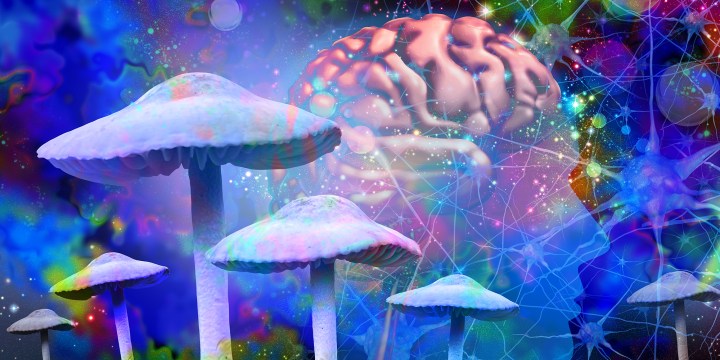THERAPEUTIC PSYCHEDELICS OP-ED
What you should know about the shroom boom and the potential psychedelic shift in mental healthcare

Frontier research is generating strong evidence to suggest that many psychedelics have the potential to treat numerous mental health and substance-use disorders. Several of these treatments are expected to be approved within the not-too-distant future.
Have you noticed the sudden shift towards psychedelics? Contrary to historical perspective, the use of psychedelic substances for both recreational and mental health reasons is gaining mainstream acceptance.
This drug renaissance is not just among the hedonistic youth looking for a good time, but researchers and citizenry alike are pricking up their ears to the therapeutic potential of psychedelics. So, what does this mean for the future of mental healthcare? Will psychologists and psychiatrists take on a Morpheus-esque stance, and offer you that red pill?
It’s hard to say at the moment as psychedelic substances, such as psilocybin, LSD and MDMA are still somewhat hampered by criminalisation and policy. However, frontier research is generating strong evidence to suggest that many psychedelics have the potential to treat numerous mental health and substance-use disorders. Several of these treatments are expected to be approved within the not-too-distant future.
Psychedelics were used thousands of years ago by many cultures
Psychedelics have in fact been used by many cultures for thousands of years, so why does it feel like modern society is only just catching on now? It’s hard to believe that less than 100 years ago, Western media touted psychedelics for their revolutionary medicinal properties.
In the 1950s and 1960s the science of psychedelics exploded as researchers explored their therapeutic potential. However, by the 1970s, public opinion shifted radically. Psychedelics were soon banned for medical and recreational use, due to their presumed highly addictive potential and “lack of medicinal properties”. This happened first in the US and then globally.
Since then, these assumptions have been disproved. After the long hiatus from psychedelic research, momentum is once again picking up for the investigation of these substances in the treatment of psychiatric disorders.
Psychedelic-assisted therapy could provide alternative treatments for debilitating mental health disorders including PTSD, major depressive disorder, substance-use disorders and more. Preliminary research shows that psilocybin may help treat severe depression, MDMA has proven to be effective in treating PTSD symptoms and LSD shows potential mood-modulating properties.
So, why have people turned to psychedelics for their personal mental health needs? This shift speaks to two characteristics of psychiatry and the mental health field in general.
Firstly, mainstream psychiatry has gone stale. Over the last decade, not much has changed in terms of novel treatments for mental health, so returning to the exploration of older and potentially effective psychedelics is becoming increasingly popular.
Secondly, the stigma associated with mainstream therapeutic modalities is driving people towards more “natural” treatments. These remedies are often regarded as less risky due to their natural origin.
However, before you start popping an extra special mushroom into your next pasta dish there are a few things you need to consider.
Much of the current literature on the therapeutic benefits of psychedelic substances is based on experiments done in controlled environments. This means that there is a skilled therapist present to help guide and supervise the experience. It is believed that in this environment substances such as psilocybin can facilitate personal growth and self-exploration.
Potential for harm in an unmonitored environment
However, an unmonitored environment could elicit a potentially harmful experience. This is often referred to as a “bad trip” and can leave the person feeling increased anxiety, paranoia, or panic.
Secondly, the current research has been limited to fairly small sample sizes, often excluding individuals who have a history of psychotic disorders, histories of drug use and comorbidities, which puts into question the generalisability of this research to a larger representative patient sample.
Thirdly, the very nature of psychedelics undermines the reliability of a randomised control trial (RCT). RCTs have for almost half a century been considered the gold standard in evaluating effectiveness research.
The process involves recruiting a group of participants with a certain condition and randomly separating them into at least two groups. One group receives the experimental intervention while the other group, known as the control, receives a placebo. The idea is that neither group should know if they have received the intervention or not in order to filter out any biased results.
Unlike a novel hypertension drug, psychedelics induce a strong and obvious result, thus participants would know what group they were assigned to. In essence, this results in the anti placebo effect, and could lead to the benefits of psychedelics being overestimated by our current research methods.
As we stand at the metaphorical starting line of psychedelic research watching the race begin, there are so many questions yet to be answered.
Could the use of psychedelics in mainstream therapy be the answer to the mental health gap globally and in South Africa? Is all the research currently being done culturally translatable to our context? We are yet to find out.
But in a nutshell, psychedelic research is in its foetal stage of development, there is a lot of potential, yet a lot of unknowns.
So, unless Morpheus is a psychiatrist, and you’re in a contained, safe environment, think twice before taking that red pill. DM
Morgan Watson holds a BSocSci Honours in Psychology and is a Content Developer in the HIV Mental Health Research Unit, Department of Psychiatry and Mental Health, University of Cape Town. Rachel Joska holds a Bachelor of Arts degree in Psychology and Linguistics and a BSocSci Honours in Psychology degree from the University of Cape Town, and writes in her personal capacity. Professor John Joska is Head of Clinical Services (psychiatry) at Groote Schuur Hospital and Director of the University of Cape Town HIV Mental Health Research Unit.



















Comments - Please login in order to comment.